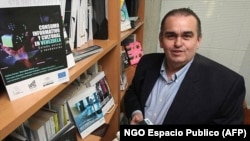As President Nicolas Maduro was inaugurated for a third term Friday, exiled Venezuelan journalists and opposition parties condemned the arrests of a prominent press freedom activist and a well-known opposition figure.
Venezuela’s neighbor, Colombia, cited the arrests when it announced that the country’s leader would be skipping Friday’s ceremonies.
The Venezuelan government said this week that it had detained seven “mercenaries,” including two Americans. However, the political party, Popular Will, said authorities have detained up to 19 people.
Among those is Carlos Correa, a lawyer, journalist and director of Espacio Publico, a civil association that defends freedom of expression. Witnesses saw hooded figures take the 60-year-old journalist away, his nonprofit said on social media platform X.
The government said it has also arrested Enrique Marquez, 61, a politician who ran in the 2024 presidential elections and later backed Edmundo Gonzalez as the victor. Marquez is accused of trying to stage a coup against Maduro, the government said Wednesday. It made no comment about the arrest of Correa.
Gonzalez said that masked men had also taken his son-in-law on Tuesday while he was taking his children to school.
Journalist arrest condemned
The arrest of Correa rocked Venezuela’s media community, many of whom are in
exile because of a repressive media environment.
“The journalistic community is shocked that the regime would cross the line of detaining such a prominent human rights advocate,” said documentary maker Juan Ravell.
“Most journalists that have been harassed and persecuted in Venezuela know of Carlos’ work because he is usually the first you go to when something happens,” Ravell told VOA.
Ravell, who left Venezuela for the U.S., directed the film A Dangerous Assignment, about a large-scale corruption case in Venezuela which aired on Frontline on PBS.
“Attacks on press freedom in Venezuela have escalated post July 28 [the date of presidential elections] and Carlos’ detention goes a step further in this worrying path. We hope that international pressure persuades the government to release Carlos,” said Ravell.
Clavel Rangel, who went into exile in 2020 amid legal threats, said that Correa and Espacio Publico are “an ally of journalists and press workers who have been subjected to judicial proceedings or who, like him, have been subjected to forced disappearances.”
Rangel had been accused of libel after she and a colleague reported on Venezuela’s metal sector.
“As a Venezuelan journalist, I demand his immediate release. Carlos’ team has [helped] journalists with a text message, with the assistance of lawyers, legal advice and hundreds of reports that leave a record of what happens to press workers,” she said.
Rangel added, “Personally, I have much to thank Carlos for: my training as a journalist and as a journalist who has needed legal assistance several times.”
The Venezuelan Communications Ministry did not reply to an email from VOA asking for a comment about the arrests.
Political turmoil
The country’s interior minister confirmed the arrest of Marquez, whom it said had attempted to stage a coup against Maduro, the AFP agency reported.
"Enrique Marquez is part of the coup they wanted to carry out in Venezuela," Diosdado Cabello said on television, adding that Marquez was "linked to the FBI gringo" — an unnamed American whom authorities say they have also arrested.
The Venezuelan government has repeatedly accused the opposition of plotting with foreign governments to commit acts of sabotage and terrorism.
Caracas is investigating major opposition leaders for alleged conspiracy, among other charges, and has repeatedly accused the opposition of inciting violence with its claims of victory in the July election.
The opposition published ballot box-level tallies which, it says, show a resounding victory for its candidate Gonzalez.
Gonzalez is recognized by several countries, including the U.S., as president-elect. He is currently on a tour to promote the opposition’s cause. The Venezuelan government is offering a $100,000 reward for his capture.
Venezuela’s electoral authority and the country’s top court say Maduro won but have not published detailed tallies to verify this claim.
In a speech after being sworn in Friday, Maduro claimed to have “complied with the constitution” and accused external powers of attacking Venezuela.
But the contested election and arrests of media freedom campaigners and opposition politicians prompted some foreign leaders to boycott Maduro’s inauguration.
President Gustavo Petro of Colombia said on social media that the detentions of Marquez and Correa meant he could not attend Maduro's inauguration.
Petro added that he would not break relations with Venezuela, with whom he has sought to increase trade.
Panama's Foreign Minister Javier Martinez-Acha described Maduro as a "tyrant."
The Spanish government said neither Spain nor the EU would send a representative to Caracas for Friday’s ceremony.
Jose Manuel Albares, the Spanish foreign minister, told reporters that the EU was coordinating a common position against the Maduro government to guarantee the "physical integrity, freedom of expression and freedom of demonstration." Spain too has granted asylum to Gonzalez.
The U.S. on Friday also announced new sanctions on Venezuelans, including the president of the state-owned oil company and military and police officials who the Treasury Department said played “roles in carrying [out] Maduro’s repression and human rights abuses.”







